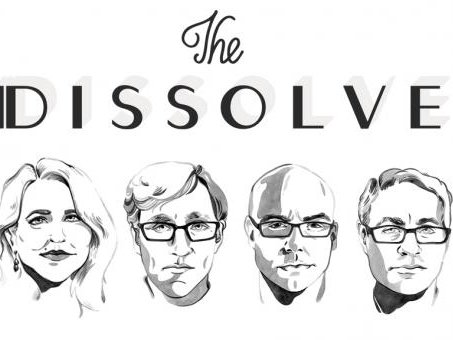When Roger Ebert tragically died last April, there was a great deal of reflection on film criticism from those inside and out of the critic community. Some wondered if the world would ever see a critic like Ebert again, somebody who crossed into the mainstream thanks to a writing style and persona that was insightful yet entertaining, authoritative yet friendly and relatable. He could sound like a professor and just a good friend in the same sentence.
Ebert and his impact on the world of film criticism could never be replaced or replicated, but there are many places where his spirit lives on, inspiring an entire new generation of film fans, both casual and hardcore. One such place is The Dissolve.
Launched in early July, The Dissolve is a criticism website with its focus set entirely on film. Of course, there are reviews of all the latest releases, both in theatres and on demand, but there are also new features taking a fresh look back at the films of yore.
For instance, there is a column called Forgotbusters, in which author Nathan Rabin takes a look back at movies that finished in the top 20 of the box office of their respective years but have since been forgotten (such as "Congo," a movie that’s somehow not as much fun as a movie starring Bruce Campbell and killer monkeys should be).
"We can be a site that has a much broader mission, not just focused on what’s happening right now and in the future," said editor Scott Tobias.
"We love the idea of being a single stop for people who love film," added Keith Phipps, the website’s founder and editorial director. "I think that’s true to the way people experience film, which is not just taking in the new stuff. It’s always about the movies you live with for a long time or the movies that you found from the past that you might not have known about."
Phipps came up with the idea for The Dissolve back in December when, after 15 years at the pop culture website The A.V. Club, the two parted ways.
"I really got into this to write about film," Phipps said, "and my duties kind of took me elsewhere, which was very pleasurable and exciting. I liked writing about music and television, and editing pieces about all of that. That was great, but with a new chapter starting, I really just wanted to get back to what excited me in the first place."
So Phipps went to Pitchfork and its president Chris Kaskie with the idea for a brand new film website. Spoiler alert: The pitch worked. Phipps then recruited many of his former colleagues at the A.V. Club – Tobias, Tasha Robinson, Genevieve Koski, Nathan Rabin and Noel Murray – and a new one in Matt Singer from Criticwire to fill the new website’s roster.
"I missed working with my old co-workers, and I guess they missed working with me enough to hook up with me," Phipps said. "It’s very exciting to be back working with a lot of them and then bringing in some new people, like Matt Singer, and some new freelance contributors. It’s been a lot of fun so far."
For Tobias, who met Phipps back in 1997 at a screening of "Good Will Hunting," it wasn’t a particularly hard sell.
"To start something new with people who I’ve worked with for many, many years, and to do it in a really idealistic way for a great, truly independent company, that’s an opportunity that I would’ve never passed up, even in my best years at the AV Club," Tobias said. "And I had plenty of good years."
Even with less three months under its belt, The Dissolve has already become a go-to location for cinephiles, so much so that Milwaukee Film named the site one of its tributes for the 2013 festival. As honorees, Phipps, Tobias, Robinson and Rabin will be presenting one of their favorite films, Brian De Palma’s "Blow Out," at 4 p.m. on Saturday at the Oriental Theatre.
"I think ultimately we settled on the idea of going big, and 'Blow Out' is big," Tobias said. "A lot of us love Brian De Palma, and I think it’s his best film. And then I think we wanted something that was about the movies. And 'Blow Out' is that as well. It checked a lot of boxes for us. Personally, I’m incredibly excited just to see it in 35mm. I just came back from the Toronto Film Festival, and I didn’t see a single film on celluloid. Everything was digital. It’ll be fun to see something projected in 35. I don’t know when I’ll ever have a chance to see that again."
The death of film and the rise of digital projection (which Tobias described as "a little sterile and antiseptic") will likely be a topic at The Dissolve’s State of Cinema roundtable discussion, which will take place Saturday at 1 p.m. at the Colectivo Coffee on Prospect. Film’s demise has been the subject of many hot debates. Even Tobias and Phipps land on somewhat different sides of the issue.
"I think if film started as projected video, I don’t think we’d be talking about it as movie magic anymore," Tobias said. "I think it’s lost something. I think film has a tactile quality that makes an impression on us, even if we’re not conscious of it. I definitely find myself missing it quite a bit."
"I try to be a little format agnostic as much as possible," Phipps added. "I never thought I would hear my younger colleagues talking about 35mm screenings like they’re talking about unicorns. I didn’t see that coming. I think digital projection is here to stay, and ultimately, fine. We’ll all deal with it."
Instead of digital projection, Phipps noted a different issue currently plaguing the film industry during what he called a "period of transition."
"I think the more concerning thing is this impossibility of medium-sized films finding much of an audience," Phipps said. "I feel like arthouses are kind of overcrowded with almost too many titles where it’s hard to keep up, and the multiplexes don’t have enough choice there."
One of the ways audiences have coped with this problem, Phipps noted, has been the use of video on-demand, something The Dissolve attempts to address and stay on top of. On one hand, VOD allows film fans in smaller cities to see the kind of small, independent films that were once seemingly exclusive to New York and Los Angeles. On the other hand, even with the progress made in home theater technology, it’s not the same as the big screen experience.
"I like seeing movies with audiences," Tobias said. "Despite some of the problems that come with that, like smartphone usage, I like that communal and social experience. I feel a little bit like the landscape is set up now where it’s almost like iPods, a much more individual experience."
Even with some of cinema’s growing pains, however, both critics are optimistic about the future of film. They named films like "Taxi Driver" and "2001: A Space Odyssey" (as a child, Phipps even programmed a "2001" adventure game using BASIC on his Apple IIe, "the nerdiest thing I’ll admit to doing") as major inspirations, but it’s a different influential movie that Phipps quoted to describe his outlook on the medium.
"Ultimately, I feel a little bit like ‘Jurassic Park:’ Nature finds a way, and I think film finds a way."
As much as it is a gigantic cliché to say that one has always had a passion for film, Matt Mueller has always had a passion for film. Whether it was bringing in the latest movie reviews for his first grade show-and-tell or writing film reviews for the St. Norbert College Times as a high school student, Matt is way too obsessed with movies for his own good.
When he's not writing about the latest blockbuster or talking much too glowingly about "Piranha 3D," Matt can probably be found watching literally any sport (minus cricket) or working at - get this - a local movie theater. Or watching a movie. Yeah, he's probably watching a movie.







